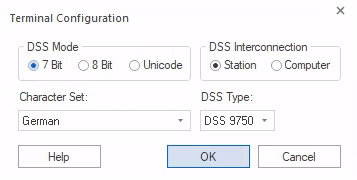MT9750 supports the following character sets:
7 Bit | 8 Bit and Unicode |
|
|
MT9750 does not support a function that enables you to load character sets from the host.
Unicode support
Unicode mode enables characters from different character sets to be displayed in a form (example: Greek and Cyrillic characters).
Unicode is an international standard that has the long-term aim of defining a digital coding for every character or text element from every known script. Characters from the most important ISO character sets (such as the ISO standards from the 8859 series) have a 1:1 correspondence in Unicode, which means that an unaltered result is obtained when converting from one to the other and back.
Unicode values are displayed using the following notation: U+xxyy
Prerequisites for Unicode
Selection of Unicode and DSS Type 9763 under Configuration > Terminal Settings (DSS) > Configure Terminal in the menu
Host sends the Unicode flag.
Advantages of Unicode
Simultaneous display of characters from different character sets
Copy/Paste operations using Unicode characters
Printing of Unicode characters
P key editor adds Unicode characters to the P key memory
Full support for ISO-compliant Unicode characters (ISO 8859-x; x=1, 2, 5, 7, 9, 15)
Support for some non-ISO8859-compliant characters
However, printing of non-ISO8859-compliant characters is not possible.
More information about Unicode can be found in the “Unicode in BS2000” manual [4].

